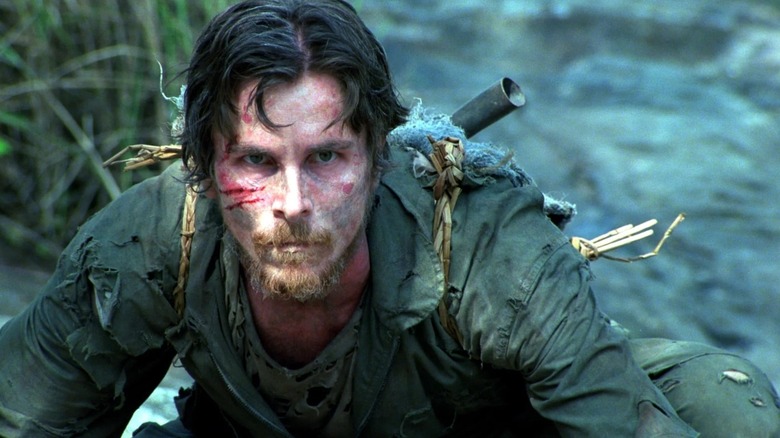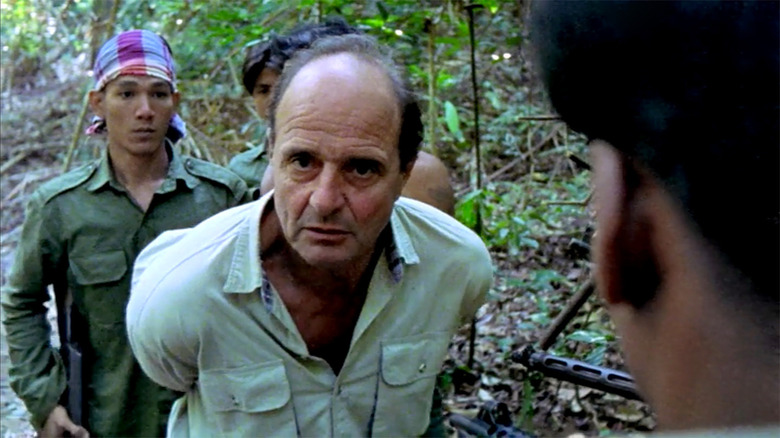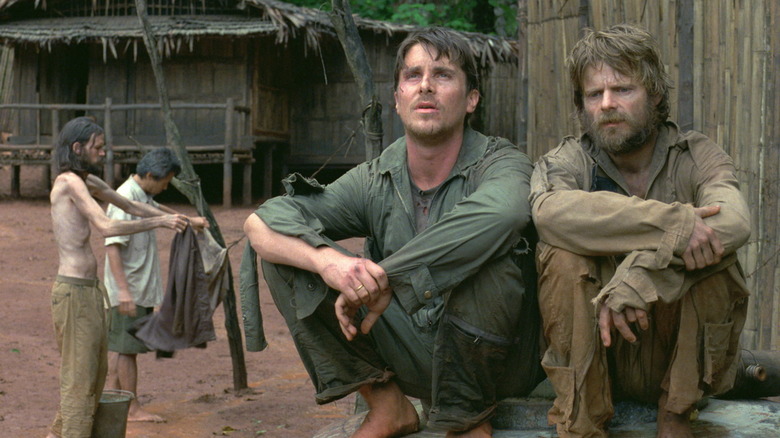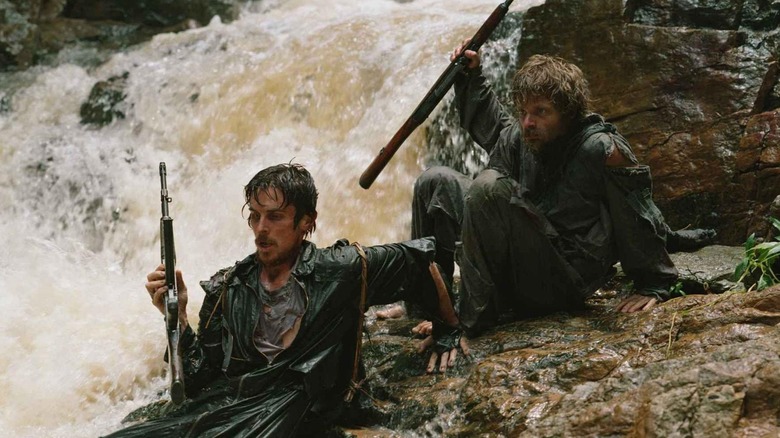Christian Bale Thought Werner Herzog Was Going To Get Him Killed
Werner Herzog has always been drawn to people like himself; dreamers, eccentrics with peculiar passions, obsessives driven to the ends of the Earth by their burning desires. Their compulsion often brings them into direct conflict with nature, and Herzog tells these stories over and over again, sometimes blurring the line between subject and filmmaker.
The most famous case was "Fitzcarraldo," charting the adventures of a maniacal music lover who drags a steamboat up a hill from one river to another in search of lucrative rubber, all to fulfil his dream of building an opera house in the jungle. As Les Blank's "Burden of Dreams" documented, Herzog was not content using models, and instead, he decided to recreate this feat of engineering and sheer determination in real life.
Then you have the doomed Timothy Treadwell in "Grizzly Man," fatally trying to commune with large dangerous animals, or the collection of likeminded misfits gathered at the bottom of the planet in "Encounters at the End of the World." While Herzog is clearly struck by the power of nature, he is more fascinated by the personalities of these wayward pioneers than their situations, following them along strange tangents in his quest for an "ecstatic truth."
One of his most engaging subjects was Dieter Dengler, a German-born U.S. flyer who was shot down over Laos during the Vietnam war and survived six months of starvation and torture before eventually escaping. He and Herzog became friends, and the director was so impressed with Dengler's story of outlandish fortitude that he made two films about him, one of which was a documentary, while the other was a dramatization starring "The Dark Knight" leading man Christian Bale.
Little Dieter Needs to Fly vs Rescue Dawn
At the beginning of "Little Dieter Needs to Fly," Dieter Dengler tells the story of how, as a child growing up in wartime Germany, he was once thunderstruck by the sight of a low-flying Allied fighter and its pilot. That vision inspired him to fly at any cost, a dream that took him from post-war Germany to the States, where he became a pilot for the Navy, then to the Vietnam war.
The bulk of the film covers his ordeal after he was shot down in Laos, and Herzog audaciously persuaded Dengler to return to the place of his brutal captivity for the film. Incredibly, Dengler remains an enthusiastic storyteller even when surrounded by Laotian extras holding rifles, enthusiastically describing his torture and escape.
Herzog dramatized Dengler's experiences nine years later in "Rescue Dawn." He always envisioned the story as a feature film, but it took it a while to raise the necessary funds (via New York Times). With a $10 million budget, the film is a blockbuster compared to Herzog's usual films, and he also had a big Hollywood star to play the lead. With Christian Bale taking the Dengler role, Steve Zahn and Jeremy Davies also joined the cast for a tough shoot in the jungles of Thailand. The movie is also notable for including the Herzog's first use of digital visual effects during an early flying scene. But there was nothing fake about the way Bale thoroughly plunged himself into his performance once he was on the ground.
Bale went all-in on his performance as Dengler
Compared to the love-hate relationship between Herzog and his old muse Klaus Kinski, Bale's experience with the director was rather benign (via GQ):
"He can be the kindest of souls and then the most cantankerous man you've ever come across. There was never a dull moment. The thing with Werner is that he won't be outdone by anyone else, especially not his lead actor. On set he would be diving into rock pools, crawling headfirst over rapids – all entirely unnecessary. But we enjoyed trying to outdo one another."
Herzog was also full of praise for Bale (via New York Times):
"He was the most disciplined, wonderful man. And he has great emotion of depth. Christian was so dedicated to this film. He did things that an actor of his caliber normally would not do, like eating maggots or catching a live snake. You just name it. It's unbelievable."
Christian Bale's accent comes and goes as Dengler, but his total commitment to the film is impressive. He scrambles through the jungle, gets dragged by a water buffalo, grapples with a live snake, and tucks into a plate of worms with the gusto of a starving man. As a devoted method actor, he also dropped 55 lbs. to look authentically malnourished, and like Leonardo DiCaprio's raw bison liver-munching exploits in "The Revenant," there seems to be a gleeful masochism in the way he puts himself through the wringer for his art. Bale wasn't completely fearless, though, and there was a risky helicopter situation that pushed his patience to the limit.
Things got a little dangerous in the final scene
There was one scene in "Rescue Dawn" where Bale took exception to Herzog's methods, while filming Dengler's helicopter rescue. The director, wrapped up in blocking the scene, disregarded the safety concerns of the producer. Bale lost his temper, warning Herzog: "I am not going to f**kin' die for you, Werner! You got that?" Bale told GQ:
"We were in the helicopter... and we're in the jungle on top of that. It was flown by these pilots that were crazy and they would take off in these crazy manoeuvres and you'd take out half a tree as you went. And I was standing, you know, on the rail, just hanging on from it. It was something else. I can't remember what he suggested, but obviously in that moment I didn't agree."
As we know from the tragic accident on the set of "Twilight Zone: The Movie," helicopters can be extremely deadly props. Thankfully, no harm was done, Herzog apologized, and the director and star made amends.
Herzog is deeply committed to telling this story, yet visualizing Dengler's tale without his unique voice borders dangerously on turning it into a two-hour catalogue of misery. Nevertheless, it is beautifully shot, and those familiar with the earlier film can have some fun picking up the Dengler-isms coming from Bale's mouth. While nowhere near as riveting as "Little Dieter Needs to Fly," the dramatization in "Rescue Dawn" is still a worthy companion piece. Together they make a fascinating study in the limits of human endurance, as experienced by a truly remarkable person.



